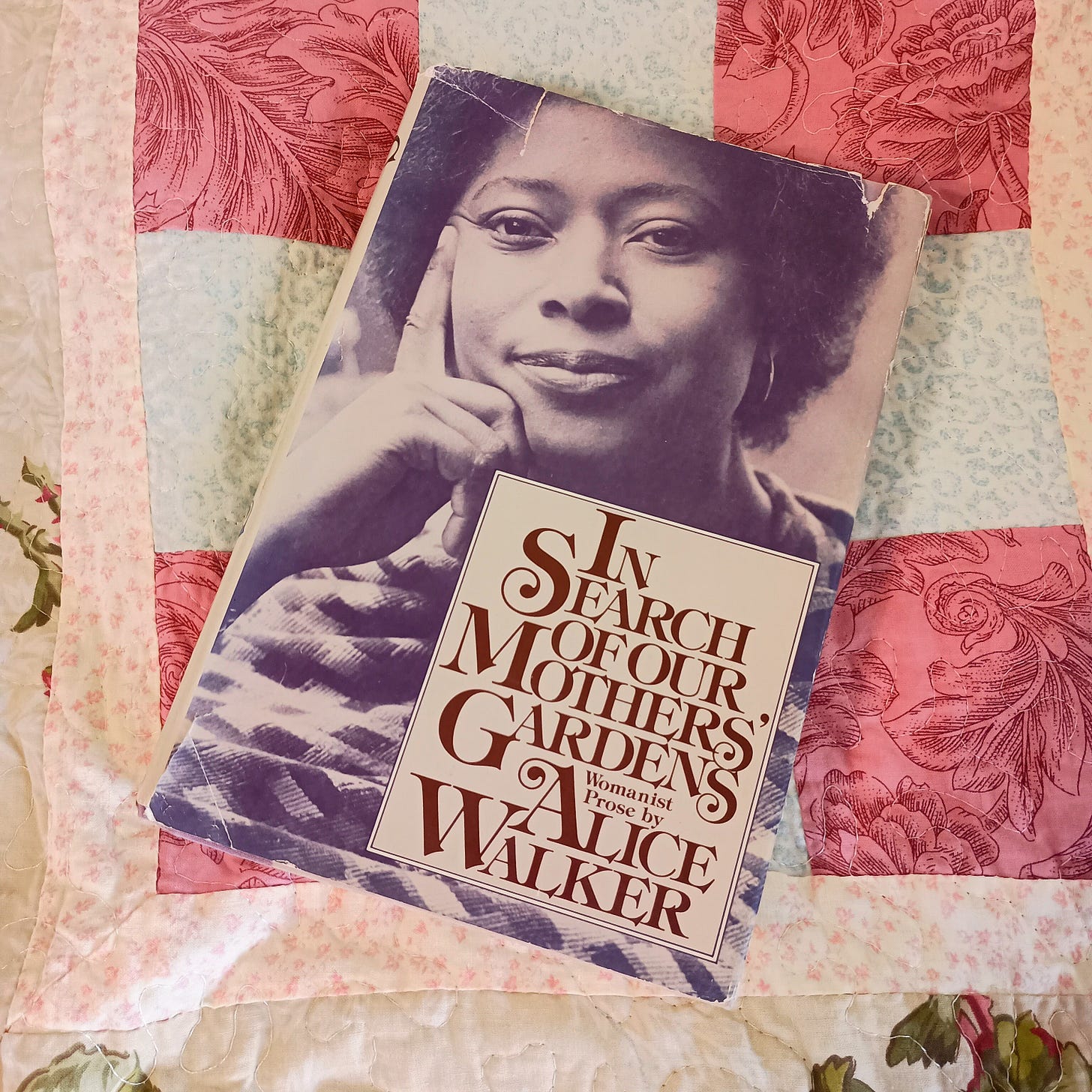Title: In Search of Our Mothers’ Gardens
Author: Alice Walker
Publisher: Harcourt Brace Jovanovich
Publication Year: 1983
ISBN: 0151445257
Rating: 5 stars
Recently, I re-read The Color Purple for one of my book clubs. I hadn’t read it for awhile and I got really into the story and Walker’s writing, so I decided now would be a great time to pull this collection off of my TBR and read it.
This book is a collection of essays on a series of different topics that range from Black identity, to the Civil Rights movement, to Walker’s own life, to feminism, to child rearing, to education, to writing process, and Southern writers.
In several of the essays, she talks about Zora Neale Hurston, another black, southern, female writer; a writer you have probably heard of or even maybe had to read in school (I always assigned Hurston as an English teacher). However, that hasn’t always been the case. After her death (Hurston died so poor that her neighbors had to take up a collection for her funeral), Hurston’s work fell into obscurity. Her books went out of print and she was at risk of being forgotten by the literary world. In the 70s and early 80s, Alice Walker played a huge role in changing that. Walker found Hurston’s work and taught it in her college classes. She talked about it in her essays and always remembered to bring both Hurston’s fiction and her non-fiction into conversations about Black writers. Walker also did the work to find Hurston’s unmarked grave and have a headstone put in so that Hurston could be properly memorialized. I used to talk about this when I taught Their Eyes Were Watching God, but Walker herself talks about these events and does literary analysis of multiple elements of Their Eyes Were Watching God in these essays and hearing it from Walker herself was really great. It provided a lot of perspective that I had been missing before.
In addition to Hurston, Walker talks a lot about Phillis Wheatley, an early American female poet. Wheatley was sold into slavery in her childhood and ended up being purchased by the Wheatley family in Boston. Even though she was enslaved, the Wheatleys had Phillis educated and she showed an impressive aptitude for poetry and became a well-known author both in America and Great Britain. Wheatley was emancipated shortly after her book was published, but struggled with poverty because she had always been sickly and couldn’t do the physically demanding labor available to free African Americans. She ended up dying of malnutrition when she was even younger than me. Wheatley has popped up in several things that I’ve read recently so she and the tragedy of her short life have been on my mind a lot lately. Apparently, she is on Walker’s mind a lot too because Wheatley, her prodigious talent, and her tragic circumstances are recurrent themes of these essays.
Another of my favorite essays in this collection is the titular essay “In Search of Our Mothers’ Gardens”. I had to read the essay for one of my feminist theory classes in college and it changed the way I think about a lot of traditional art forms, so it has stuck with me since then. I was glad to re-read it in this book. I had originally read it together with Virginia Woolf’s “If Shakespeare Had a Sister” and both essays have a similar premise and work well when juxtaposed. In this essay, Walker argues that while there aren’t a lot of recognized female poets, writers, and artists in history it is only because women lacked access to these realms, not the aptitude, and that their artistic flair has had to manifest in different ways as a result. For example, Walker’s own mother who married young and had 8 children in rapid succession never had the time or energy to sit down and write a poem. However, throughout her entire life she cultivated gorgeous gardens everywhere she lived—gardens that bloomed March through November and continued to thrive and be the envy of the neighborhood long after the family moved away. Her flowers were her poetry. Likewise Walker cites the gorgeous quilts enslaved women who were not allowed to learn to read were able to create out of scraps and cast offs and how these quilts are also artistic expressions even if they feel quotidian. While women have often been purposely kept out of the artistic and literary worlds, they have created poems out of the tasks of their daily lives and this is the female literary canon.
Walker also has an essay in this collection titled “Writing The Color Purple” wherein she talks about her writing process for and life during the period in which she wrote The Color Purple. Having just read the book, it was interesting for me to see the ways in which the characters came out and spoke to Walker in her mind and told her their stories for her to transcribe them. I thought that it was funny that apparently the characters were pretty particular and made some pretty specific demands about where Walker was allowed to live while she wrote about them. Every writer seems to have a different writing process, so it was fun to see the process behind a book I had just finished.
This collection is beautifully written, in turns uplifting and thought provoking. It is interesting to see how much (and sometimes how little) things have changed since this book was first written. We owe Walker a huge debt not only for her literary contributions but also the ways she uplifts other writers and thinkers. This is a great essay collection and I really enjoyed reading it!




Can't wait to hear more about this in person next week!